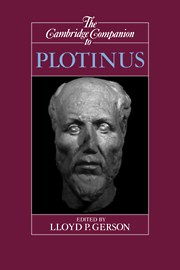Book contents
- Frontmatter
- Introduction
- 1 Plotinus
- 2 Plotinus's metaphysics of the One
- 3 The hierarchical ordering of reality in Plotinus
- 4 On soul and intellect
- 5 Essence and existence in the Enneads
- 6 Plotinus on the nature of physical reality
- 7 Plotinus on matter and evil
- 8 Eternity and time
- 9 Cognition and its object
- 10 Self-knowledge and subjectivity in the Enneads
- 11 Plotinus
- 12 Human freedom in the thought of Plotinus
- 13 An ethic for the late antique sage
- 14 Plotinus and language
- 15 Plotinus and later Platonic philosophers on the causality of the First Principle
- 16 Plotinus and Christian philosophy
- Bibliography
- Index
15 - Plotinus and later Platonic philosophers on the causality of the First Principle
Published online by Cambridge University Press: 28 May 2006
- Frontmatter
- Introduction
- 1 Plotinus
- 2 Plotinus's metaphysics of the One
- 3 The hierarchical ordering of reality in Plotinus
- 4 On soul and intellect
- 5 Essence and existence in the Enneads
- 6 Plotinus on the nature of physical reality
- 7 Plotinus on matter and evil
- 8 Eternity and time
- 9 Cognition and its object
- 10 Self-knowledge and subjectivity in the Enneads
- 11 Plotinus
- 12 Human freedom in the thought of Plotinus
- 13 An ethic for the late antique sage
- 14 Plotinus and language
- 15 Plotinus and later Platonic philosophers on the causality of the First Principle
- 16 Plotinus and Christian philosophy
- Bibliography
- Index
Summary
Within the history of philosophy, Plotinus is presented as the founder not only of a school, but of an entire current of thought, which we are accustomed to call “Neoplatonism.” From Hegel onward, the relationship between later thinkers belonging to this current and its founder has been presented as an increasing systematization of a rich and somewhat chaotic thought into a deductive structure. This process is seen as having reached its summit with Proclus, who distinguishes himself from Plotinus precisely insofar as he gives to Neoplatonic philosophy a systematic order. However, many relevant contemporary studies show that this model does not exhaust the complexity of the historical development of Neoplatonic thought.
The first part of this study will deal with the most prominent features of Plotinus's interpretation of the Platonic doctrine of Ideas, and it is meant to elucidate the set of basic philosophic tenets issuing from this interpretation, which later Platonic thinkers endorsed as the common inheritance of their philosophy. In the second part I shall try to set out the reasons why, within the development of Neoplatonic thought, Plotinus's representation of suprasensible reality gave way to a more complex picture.
- Type
- Chapter
- Information
- The Cambridge Companion to Plotinus , pp. 356 - 385Publisher: Cambridge University PressPrint publication year: 1996
- 7
- Cited by

